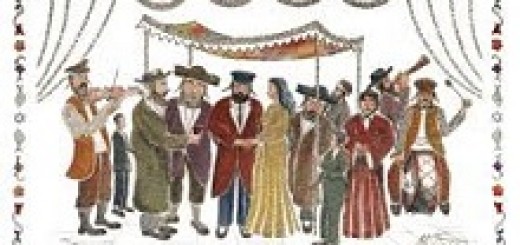By Leibel Estrin
Some women feel that not having as many opportunities to fulfill G-d’s commandments is represents some sort of discrimination. Perhaps it does, but not in the way they think. Throughout Jewish literature, we find an interesting consistency. In the morning blessings many women say, “Blessed are You, L-rd our G-d,King of the universe, who made me according to Your Will.” In Tana D’ve Eliyahu, we find, “Who is a proper wife? One who works her husband’s will.” Shlomo HaMelech calls the woman, the “crown of her husband.”
The theme that connects is the concept of Ratzon, Will. In the
G-dly spheres and in human beings, Will is associated with a level above and beyond intellect. One example is women’s intuition. It is a feeling that may not be connected to anything apparent. It may even be contrary to surface appearances. Yet it often describes what turns out to be an emerging state of reality. This talent for intuition has an interesting implication. In Judaism, a woman cannot ordinarily serve as a judge in a legal case. According to Rabbi A.J. Twerski, the renowned psychiatrist, the reason is because they intuit who is innocent or guilty before any evidence is presented.
The contemporary kabbalist and scholar Rabbi Yitzchak Ginsburgh calls this level of Ratzon, “the source of all superconscious experience…. the force that propels one into consciousness…[1]”
Men, by comparison, are typically bound within the confines of reality. They express themselves through Chochmah. According to Ginsberg, Chochmah is “the innovative force that produces spontaneous insights… which serve to spark subsequent pursuit of meaningful knowledge.” Men typically have a reason for everything they do or say. They focus on an objective. When they communicate, it’s generally to give information.
By commanding men to perform mitzvos, G-d has enabled men to access the Divine Will that is more accessible to the feminine psyche. At the same time, many of the mitzvos and customs (e.g., wearing a yarmulke, tefillin, etc.) that men perform serve to remind them of their limitations (i.e., egos) and to encourage them to recognize their Maker.[2]
The point is, Judaism recognizes both male and female qualities and addresses them as equal yet different partners with G-d in perfecting the world. That perfection is achieved by being holy.
Jewish Dress and Appearance
As we mentioned earlier, the Hebrew word for “holy” (i.e. sacred) is kadosh. However, the word really means “set apart” or “dedicated to.” We demonstrate that dedication and commitment to G-d by following the Torah’s code of behavior and conduct. The Torah’s laws help us fulfill our role as representatives of “a Higher Authority.” Sadly, these codes are often at odds with the forms of behavior accepted by so-called “modern” societies.
The bottom line is that the Torah (Vayikra 19:2) calls on us to be holy because G-d is holy. The Talmud and rabbinic codes explain how men and women should fulfill that directive. In general, this standard of conduct requires Jews to avoid ostentation (i.e., self-aggrandizement) whether in speech, dress or deed.
In practical terms, clothes should not be revealing, particularly loud, or in any way call attention to oneself. Rather, one’s clothes should be modest in keeping with Jewish tradition. This not only applies to women, but equally to men—even if the community maintains a different standard. The following analogy will, hopefully, put this in perspective.
Imagine you were assigned to represent your country in an important matter. You obviously would dress and act in a way that would reflect well on those you represent. This is especially true if you knew that, initially, you would be judged by your dress. As a Jew, you represent the King of Kings. Therefore, your dress, should reflect this. The same goes for your physical appearance.
In addition to wearing appropriate clothes, Jewish men and women have their own set of standards in terms of appearance.
For example, married Jewish women cover their hair. The fact that a woman’s hair can be extraordinarily appealing is found in the Song of Songs (4:1), which states, “You are beautiful, my love, you are beautiful. Your eyes are dove-like behind your veil; your hair is like a flock of goats, trailing down from Mount Gilead.” In addition to the verse indicating that a woman’s hair should be covered, King David wrote in Psalms (45:15) “the great honor of the daughter of a King is hidden within,” which stresses modesty as a feminine ideal.
As is usual, there is a lot more to the issue than meets the eye. According to Chassidus and Kabbala, hair is associated with the attribute of gevurah or “severity.” (On a very mundane level, the life force in hair is so constricted that cutting it does not cause pain.) Interestingly, women are also identified with gevurah or din, “judgement.”[3] Too much gevurah can affect the revelation of blessings in the areas of health, livelihood, or children. Covering the hair “tempers” the gevurah so that the blessings confront fewer obstacles. Obviously, covering one’s hair does not guarantee abundant blessings. However, it is known that the Lubavitcher Rebbe (and other great sages) would state that, in addition to being Jewish law, covering one’s hair helps obtain revealed blessings in the areas of parnossa and children.
Men also cover the head with a skullcap to indicate one’s acceptance of the Kingdom of Heaven. In fact, the word for skullcap, yarmulke, may be a derivation of the Hebrew words, yira malka, “fear of heaven.”
In addition to wearing a yarmulke, males are encouraged to keep their hair short. There are several reasons for this. On a practical level, the Tefillin shel Rosh is supposed to rest on the top of the skull, between the eyes. Having a lot of hair interferes with fulfilling this precept and makes it easy for the Tefillin Shel Rosh to slip out of place.
There’s another reason for men to have short hair. Having long hair may be forbidden under the precepts of not dressing like a woman (Devorim 22:5) or following the ways of a non-Jew. (Vayikra 18:3, 20:23) Long hair is also associated with ego, which prevents a person from serving Hashem properly. Furthermore, the gevurah associated with hair can become manifest in negative ways. For example, everyone knows the basic story of Samson who was endowed with superior strength. As the events are found in Judges, Samson’s strength “grew” from keeping the locks of his hair uncut. The problem was that, in addition to physical strength, Samson had uncontrollably strong desires in other areas, which led to his downfall. Whether or not they are like Samson, men should still have short hair.
Short hair is one mark of a Jewish male. Having a beard is another. The commandment for men not to trim the beard is found in Vayikra 19:27:28, “You shall not trim your hair at the temples or mar the edges of your beard.”[4] The prohibition against shaving may also associated with Torah commandments banning men dressing like a woman and/or following the lifestyles of non-Jews, and especially idol worshippers.
From a more esoteric perspective, the beard is a revelation of something that was previously hidden. According to our sages, Hashem has 13 strands in His beard. They correspond to the 13 Attributes of Mercy that G-d used to initiate creation. For that reason, a beard is associated withrachamim or “mercy.” The story is told of a man who came to the 19th century rabbi, Shlomo Klugar. The man said that he and his wife had children, but that they did not survive infancy. He asked the rabbi for advice. Rabbi Kluger replied, “A baby naturally grabs his father’s beard. Since you have no beard, your children have nothing to hold. Let your beard grow and your children’s lives will be sustained.” The man followed Rabbi Kluger’s advice and he and his wife were rewarded with healthy children.
The prohibition of cutting the corners of the beard traditionally applies to the use of a straight razor, not to scissors that don’t “shave” the skin. For that reason, some rabbis permit shaving with an electric shaver. However, many of today’s electric shavers lift the beard and cut it so close to the skin that the effect is similar to a razor. If a person has a question, he should discuss the matter with an Orthodox rabbi.
What about permanent “body art?” The Torah (Vayikra 19:28) states, “Do not put tattoo marks on yourselves, I am the L-rd.” In other words, a person’s body is not his/her own. It is the property of G-d and G-d wants a person to remember that by reflecting the dignity of man’s Maker.[5]
So far, we’ve covered how one looks. The concept of holiness also includes thought, speech and deed. Every thought represents energy. Positive thoughts emit positive energy. Negative thoughts emit negative energy. Holy thoughts emit holy energy. Ideally, a person should control his thoughts so that they are positive and holy. If a negative thought pops up, it should be pushed away. Unless you are a completely righteous person, you cannot bring positive results by dwelling on a negative thought.
Speech should also express holiness. The Torah prohibits slander, tale-bearing (even if true) and any negative speech—even positive speech is forbidden if it’s to elicit a negative response.
Therefore the best policy is that if you want to criticize anyone, criticize yourself. If you want to praise someone, praise G-d.
Typically, holiness is expressed through humility, as our sages have said, “Where you find G-d’s greatness, you find G-d’s humility.” The Torah testifies that Moshe was the most humble person who ever walked the earth. He was also aware of his accomplishments. However, he believed that, given the same background, any person could have achieved those accomplishments and perhaps exceeded them.
To put it another way, if a person feels that he is the center of his universe, there’s no place for G-d. For example, a person can do mitzvos modestly without trying to attract attention or the same mitzvos can be performed with all the trappings of one’s ego.
As much as possible, a person should always try to be as G-dly as possible by performing mitzvos and by emulating the ways of G-d in thought speech, and deed. Shlomo HaMelech (King Solomon) put it best when he wrote (Proverbs 3:6), “Know G-d in all Your Ways.”
An excerpt from the book “Judaism From Above The Clouds.”
Leibel Estrin has been writing about Jewish topics for four decades. He is working as a Jewish chaplain for the Aleph Institute. Leibel has recently published a work on Jewish perspectives and values entitled “Judaism From Above The Clouds.” To read more of Leibel’s writings and to purchase his book click here.
[1] www.inner.org
[2] Women, like men, are obligated to fulfill all negative commandments. They also “adopted” a number of positive commandments such as hearing the shofar. In addition, there are three positive commandments that apply—challah, Shabbos candles and mikva. The kabbalistic reasons behind these mitzvos are beyond the scope of this work, but they are very possibly linked to a level that is even higher than Ratzon, This level is called Taanug (Delight.)
[3] The association between women and gevurah is not negative. On the contrary, this attribute tempers the attribute of chesed “kindness” and vice versa, so that the outcome is positive. This may be why our sages say, “Women are the source of blessing in the house.”
[4] Interestingly, the Torah continues, “You shall not lacerate your bodies for the dead or tattoo any marks upon yourselves.” The Torah not only forbids tattoos on any kind for men and women, it links tattoos with idolatrous practices.
[5] If a Jewish person has a tattoo, he remains Jewish. He still has to perform all the mitzvos, including eating kosher, donning tefillin, etc. Even when he passes away, he should be buried in a Jewish cemetery.






















